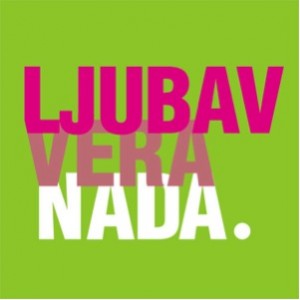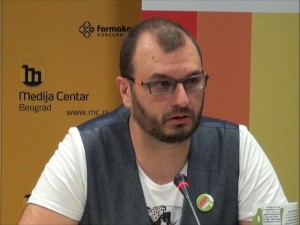Belgrade Pride Places Faith In Three Little Words
 Love, faith and hope: three universal human values that Belgrade Pride organisers hope will encourage greater positive interest in the lives, rights and issues of Serbia’s gay community. Working beneath this banner, they intend to present Pride as a meter by which to measure civil rights, freedom and democracy in the country.
Love, faith and hope: three universal human values that Belgrade Pride organisers hope will encourage greater positive interest in the lives, rights and issues of Serbia’s gay community. Working beneath this banner, they intend to present Pride as a meter by which to measure civil rights, freedom and democracy in the country.
In an effort to move forward from last year, when Serbia’s government slammed an internationally condemned ban on a proposed parade through Belgrade, Pride chiefs have opted for a more approachable Ljubav, Vera, Nada re-brand, hopeful that people from across society will come together to encourage understanding, allay hatred and reduce prejudice of LGBT people in Serbia.
Government Ban on Serbian Pride
Since the Government ban on last year’s Pride Parade, organisers have been assessing the best way to serve and represent the LGBT community. This means not only providing an opportunity to come together in unity, but also how best to positively impact the perception of the community and improve their rights and treatment in society. Part of this process has seen them surveying the LGBT community, their families and friends, as well as listening to submissions from all sides. The result is Pride 2012, a festival of events to unite the community and empower individuals to demand the equal rights that everyone should deserve.
“Belgrade Pride 2012 was created after analysis of the needs of the LGBT population in Serbia, as well as by listening to the pulse of society and current social trends,” Pride organiser Boban Stojanović said. “Based on proposals received by the organisers of the LGBT community, people who support them, and the analysis of public discussions, we have created a program that should provide the general public with the opportunity to become acquainted with the existence, culture, needs and rights of the LGBT people.
Awareness and Inclusion For Serbia’s LGBT Community
Belgrade Pride 2012 will be an eight-day programme of events (30 September to 7 October) to raise awareness and increase inclusion for Serbia’s LGBT community. Events will include workshops, discussions, presentations, concerts and film screenings throughout the city, to showcase gay culture and to provide a better understanding of the issues facing the LGBT population in Serbia.

Alongside a forum of politicians and public figures from home and abroad, Belgrade Pride is keen to see people from all sides of society participating in the seven days of talks and open debate on matters relevant to Serbia’s sizeable LGBT community. Topics pencilled in include the increase in violent attacks, threatening graffiti, and the pervading effects of institutionalised homophobia in Serbia, as well as the importance of family support, the role of education in reducing homophobia, and issues relating to religious thinking and the law.
The week will culminate in a street parade through the centre of Belgrade scheduled for 6 October, Pride chief Boban Stojanović said. The parade will start out from Manjež Park, leading through Knez Miloš and Masaryk, and ending with a concert back at Manjež Park.
Approaches will be made and necessary approvals will be sought, once the dust finally settles on Serbia’s new leadership. It remains open to question whether the new government will show any more commitment to treating all citizens with an even hand and will take the necessary action to protect the democratic right to gather and march peacefully. Groups opposed to the parade have already seen that the Serbian government is willing to fall back on the threats of protesters as apparent justification for a ban. That precedent was set in 2011, when the Serbian state and police force having to admit that it was unable to guarantee the safety of its people. Many fear that similar tactics could be used this time round.
Pride in Serbia has had a particular bad time over the years, with previous attempts being marred by extreme violence and even allegations of police turning a blind eye to what was happening on the streets of Belgrade. Events in 2001 and 2010 erupted in scenes that shocked the world, while government sanctions in 2009 and 2011 drew wide criticism.
“The organisation of Belgrade Pride 2012 is a major challenge,’ Boban Stojanović said. ”Advocating for human rights does not provide the option of victory or defeat. Everything that happens is part of a process. For Serbia to move forward we need to translate the concepts of human rights into practice. We have seen that this is not going to be easy. It will require the cooperation of the whole of society: Parliament, through the state institutions, needs to take the lead, and then this should be rolled out by education and cultural institutions, the media, civil society, and every citizen of Serbia.”
Pride in Zagreb, Split and Belgrade
It is hoped that the growing popularity and success of similar Pride events in Zagreb and Split will open the doors of opportunity in Belgrade. Already, Belgrade Pride 2012 has received support from the European Parliament, including the Special Rapporteur for Serbia, Jelko Kacin.
Nevena Petrusic, Serbia’s Commissioner for Equality recently told press that Belgrade Pride is a real opportunity for Serbia: “I appeal to everyone, especially the government, to contribute to this year’s Pride being held in a safe and secure environment,’ she told B92. “I hope the authorities will show full willingness and determination to protect the constitutionally guaranteed human rights, including the right to peaceful assembly. We have a constitution and law to prohibit discrimination. These regulations are binding on all who exercise state power in Serbia.”


8 / 23 / 2012 4:32 am
Regardless of the LGBT population, I would promote the brand „LJUBAV VERA NADA“ as a “universal” brand, which is certainly good for Serbia, with its entire history as tragic also as a successful and victorious moments. I think that a country that has survived so many absolutely have the right to promote this brand and to expand it to other countries. In accordance with the rapid development of Europe and the West, culturally and every other senses, Serbian intellectual is not at all behind on life’s misfortunes that have befallen the past years. Enough material to create something like this and win the whole world brending it into an ideological Serbia. A country that is constantly wounded after ash gave birth itdanke beautiful and successful people, and essentially covers the message of love, hope and faith.